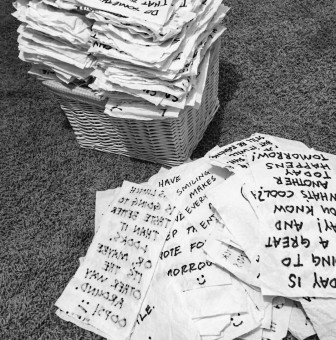At Children’s Hospital, a Note with Lunch
Patients at Children’s Hospital of Alabama now get a little extra pick-me-up. Every day, kids there receive a note with their lunches. These notes are called napkinisms. The project sprung from a local writer, who spent years writing lunchbox notes for his own children.
Just about every morning, Billy Ivey hand-writes a note for each one of his five kids. Using a Sharpie, he scribbles down a witty joke or a simple “I love you” on a paper towel. Then he adds it to their school lunch. Ivey’s been doing that for over a decade.
“Couple years ago,” Ivey says. “I wrote a note that I thought was particularly funny and I took a picture of it.”
Ivey posted the picture to social media.
“It said, ‘Remember, every time you smile, a mean kid gets diarrhea.’ And people, again, people couldn’t believe that I would write something like that to my kid, but the purpose of it was to make my kids laugh, to surprise them with something in the middle of their day.”
That idea resonated with people. Ivey started calling the notes “napkinisms.” He created a website and has a dedicated following on social media. Starting this year, kids at Children’s Hospital of Alabama are getting their own napkinisms. Every day, patients receive one of Ivey’s notes, printed onto postcards and passed out at lunchtime.
Six-year-old patient Blaklee Tew enjoys it. He picks up one of the napkinisms and reads it aloud.
“Potato chips are vegetables,” Tew reads. “Just go with it.”
Tew laughs, because he says potato chips do not count as vegetables.
Garland Stansell, head of communications for Children’s Hospital, helped launch the napkinisms partnership. He says the idea is simple.
“That somebody wrote a personal message, somebody’s thinking about you,” Stansell says. “Somebody cares that you’re here.”
And it never hurts to make a patient smile. Stansell says napkinisms is set to continue indefinitely, with plans to give staff the opportunity to write their own notes for the kids.
Outside of the hospital, anyone can join in and submit an idea on the napkinisms website. Billy Ivey says just a few words can go a long way.
“That’s where the power of this comes, you know,” Ivey says. “It’s not my responsibility to change the world or change somebody’s life, but I do have an opportunity to change somebody’s day, on a daily basis.”
Ivey says since starting the program at Children’s Hospital, there’s been an increase in public submissions on the napkinisms website. He says some of those notes may eventually wind up on patient lunch trays.
Poland’s Iga Świątek thrashes American Amanda Anisimova in Wimbledon women’s final
The Polish player emerged victorious after less than an hour of gameplay.
Israeli settlers beat U.S. citizen to death in West Bank
A 21-year-old Florida man was beaten to death by Israeli settlers while visiting family in the West Bank.
FEMA removed dozens of Camp Mystic buildings from 100-year flood map before expansion, records show
Federal regulators repeatedly granted appeals to remove Camp Mystic's buildings from their 100-year flood map, loosening oversight as the camp operated and expanded in a dangerous flood plain.
In Myanmar, a rush for rare earth metals is causing a regional environmental disaster
A drastic increase in unregulated production of rare earth minerals in Myanmar is causing serious environmental concerns downriver in Thailand, as China's influence in the sector looms large.
No playing Spanish-language music: Many immigrants say they have new rules for driving
As the Trump administration's crackdown continues, traffic stops have become increasingly important tools of enforcement. It has led many immigrants to take alternate modes of transportation.
In the Texas flood zone, volunteers help reunite lost pets with their owners
Hundreds of pets have been reported missing after the devastating floods in central Texas. Volunteers have been combing through debris to help reunite them with their owners.







